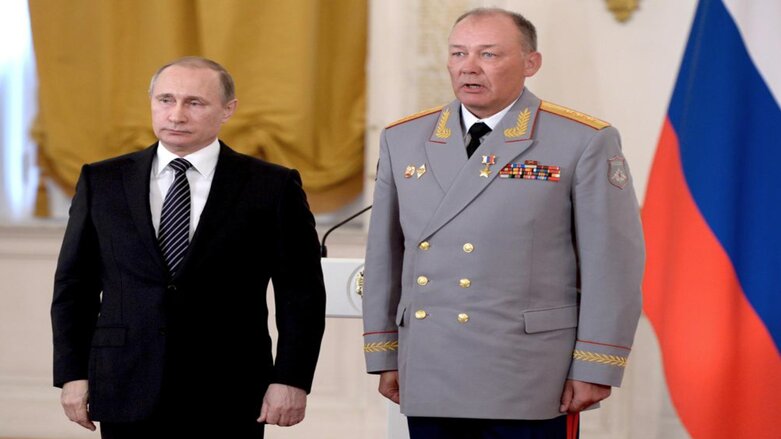Moscow appoints 'Butcher of Syria' to head Ukraine invasion

WASHINGTON DC (Kurdistan 24) – Russia has appointed a new general to lead its faltering assault in Ukraine.
The new commander, Gen. Alexander Dvornikov, 60, is notorious for his brutality against civilians, including when he commanded Russian forces in Syria. In the fall of 2015, Moscow began its military campaign there in support of its ally Bashar al-Assad as his regime was besieged by a civil war that emerged from the "Arab spring."
Dvornikov has a reputation for brutality, and US officials fear that a new, more gruesome phase of the war is about to begin.
The Guardian described Dvornikov as "an 'old school' general and a 'blood and soil nationalist,' trained in Soviet military doctrines that view obliterating civilian targets as a means of gaining battlefield momentum."
Dvornikov's military career dates back over three decades—to 1978 when he joined what was then the Soviet army. By 1982, he was a platoon commander. Later, he was an officer In the second Chechen war—for which the US and Europe both denounced Russia for war crimes that it committed against Chechen civilians.
Dvornikov in Syria—Cooperation with Iran
On Sept. 28, 2015, for the first time in a decade, Russian President Vladimir Putin came to New York to address the opening of the UN General Assembly.
Putin denounced the US policy—initiated by former President George W. Bush in the wake of the 9/11 attacks—of seeking to transform the Middle East through democracy.
"Rather than bringing about reforms, an aggressive foreign interference has resulted in a brazen destruction of national institutions," Putin said. "Instead of the triumph of democracy and progress, we got violence, poverty and social disaster."
"I cannot help asking those who have caused the situation, do you realize now what you've done?" the Russian president continued, as he affirmed that out of the chaos generated by overthrowing Middle Eastern regimes, a major terrorist group, the self-styled Islamic State, had emerged.
Putin argued that the regime in Damascus should not be overthrown. Rather, he said, the reverse was true. The international community should "cooperate with the Syrian government and its armed forces, who are valiantly fighting terrorism."
Two days later, the Russian military intervention in Syria on the side of the Assad regime began. The US complained about Russia's assault on the Syrian opposition, but Moscow claimed it was fighting terrorists.
In that campaign, headed by Dvornikov, Russia coordinated with Syrian intelligence, Iran's Islamic Revolutionary Guard Corps (IRGC) and its extraterritorial Qods Force, as well as Lebanese Hizbollah as Nicole Grajewski, a former State Department intern and an Oxford doctoral student, explained.
And over time, the Russian military campaign in Syria proved successful. It kept Assad in power and helped him regain control over most of the country, while Russia paid a small price and its forces took few casualties. Thus, Dvornikov received the "Hero of the Russian Federation" medal, one of the country's highest awards.
But Dvornikov's war in Syria was very cruel toward civilians. It is feared that something similar will happen in Ukraine, where Russia has been repositioning forces away from Kiev to focus its military operations on the east.
US Concerns of more Brutal Phase of the War in Ukraine
Speaking to CNN on Sunday, US National Security Adviser Jake Sullivan warned that Dvornikov "has a resume that includes a brutality against civilians in other theaters, in Syria," and "we can expect more of the same" in Ukraine.
Spokespersons for both the White House and Pentagon made similar statements on Monday. Dvornikov is "already responsible for overseeing atrocities in Syria," the White House's Jen Psaki stated, and "we would expect" a "continuation of the type of atrocities we've already seen" in Ukraine.
At the Pentagon, John Kirby denounced Dvornikov "and other senior Russian leaders," affirming they have shown "their utter disregard" for "the laws of war, laws of armed conflict," while "they conduct and prosecute their operations" with no regard for civilian casualties.
As Sullivan stated on Sunday, such brutalities are part of Moscow's policy. They serve to intimidate and cow a population—with the intent of facilitating Russia's military operations.
"Before the war even began," Sullivan said, "we indicated that Russia was planning to engage in acts of brutality against civilians."
"We declassified intelligence that this is not just the random acts of soldiers or units," he continued. "This is an orchestrated plot from the Kremlin."
